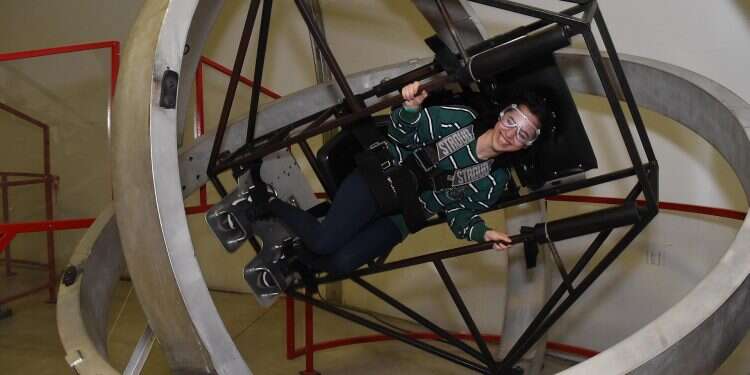"Just because I can't see the stars, doesn't mean that I can't reach them," Noa Yiflah, 18, said a teenager with vision impairment from the Israeli town of Omer who took part in a NASA astronaut training camp in the United States.
Yiflah spent 10 days at the camp last September in Huntsville, Alabama along with other teens with visual impairments from all over the world were invited to the camp. The other Israeli camper was Netta Kadosh, 17, from Mitzpe Adi.
"In the beginning, it was very nerve-racking," Noa said, "I am not a very sociable person and I was worried that I wouldn't have anyone to spend an entire week with, but in the group, you start to talk to people and get along quickly. Everyone was amazing."
She described some of the activities at the camp, including "a simulation of hovering at zero gravity and wall climbing where some kids hold the rope from the top while we descend by zip line." She also "tried out a 4G-gravity simulator... and also tried out a spacewalk in a space suit."
"I didn't want leave," Noa said, "the camp improved my self-esteem."
She made the difficult trip with the help of her teacher Anat Habusha. Habusha referred Noa to Ofek Liyladenu: The Israel National Association of Parents of Children with Blindness and Visual Impairments, an organization for children with sight disabilities, which later chose both girls to attend the trip.
Neta shared her NASA experience saying that "the highlight was the tasks we were assigned to complete. We experienced a simulated walk in space, some dived to a depth of 7 meters (23 feet) in order to feel the pressure and sense of hovering in space, just like the astronauts do. We also climbed a wall that was 8 meters (26 feet) high and jumped off of it. All of the tasks replicate those given to astronauts aboard the International Space Station. Even though you are visually impaired, you aren't exempt from any of the tasks."
Neta particularly enjoyed the control room. "The tasks there were funny and brought everyone together. I think what will stay with me forever is the understanding that I don't face my disabilities alone, there are tons of young people like me who face difficulties every day." Kemi Matas joined the girls on their trip, herself the mother of a child with sight disabilities.
Neta elaborated "I learned that despite my disability, nothing can stand in my way. The tasks were done a bit awkwardly and slowly, but I did not give up and finished them all."
She is currently a high school student in the biology-science track. "I want to volunteer in the Israel Defense Forces and aim to reach high. In the future, I'd like to major in biology in university, and hope that people who I will meet during my life will understand that despite my disability, I am just like them," she said.




